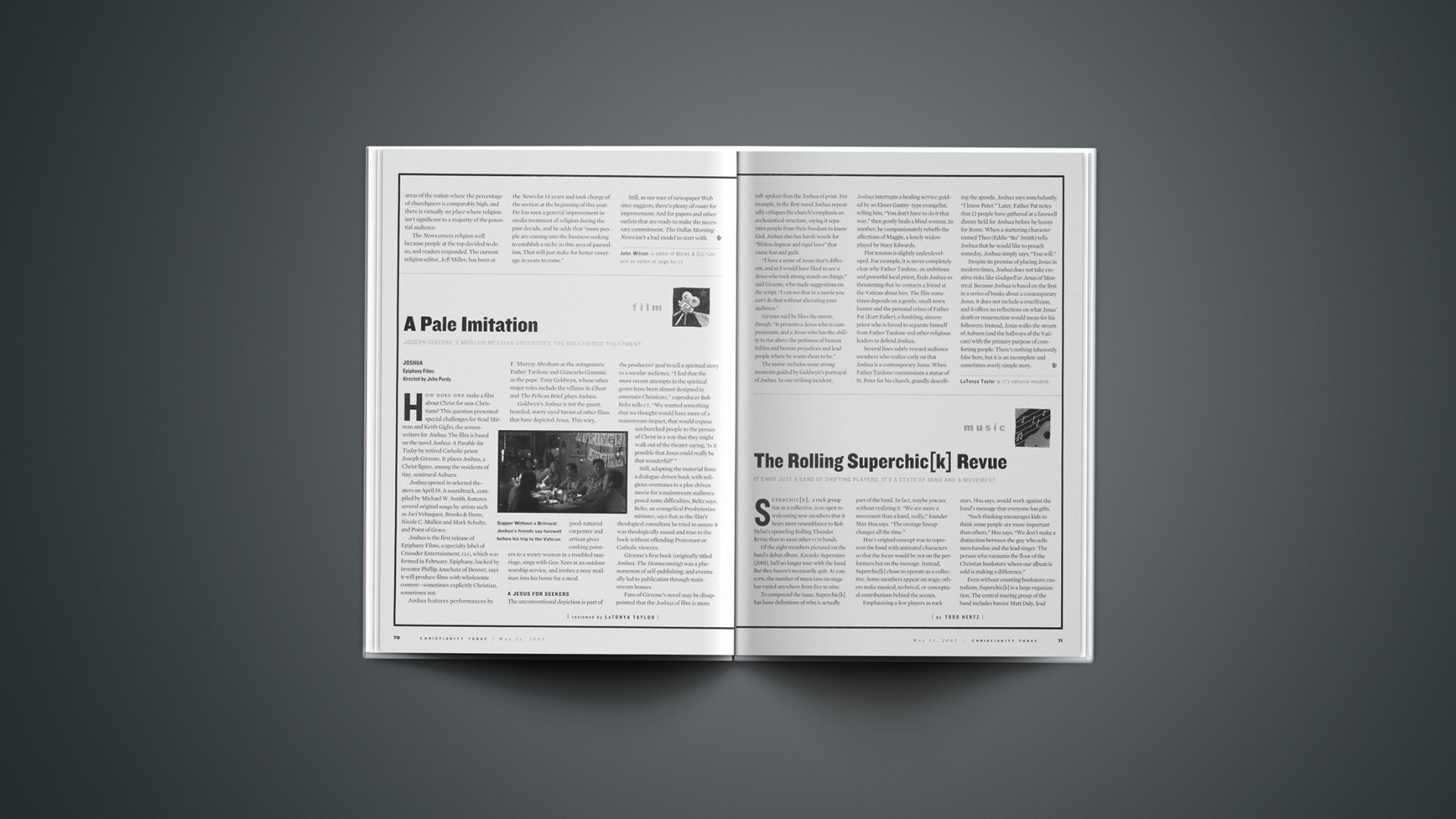How does one make a film about Christ for non-Christians? This question presented special challenges for Brad Mirman and Keith Giglio, the screenwriters for Joshua. The film is based on the novel Joshua: A Parable for Today by retired Catholic priest Joseph Girzone. It places Joshua, a Christ figure, among the residents of tiny, semirural Auburn.
Joshua opened in selected theaters on April 19. A soundtrack, compiled by Michael W. Smith, features several original songs by artists such as Jaci Velasquez, Brooks & Dunn, Nicole C. Mullen and Mark Schultz, and Point of Grace.
Joshua is the first release of Epiphany Films, a specialty label of Crusader Entertainment, LLC, which was formed in February. Epiphany, backed by investor Phillip Anschutz of Denver, says it will produce films with wholesome content—sometimes explicitly Christian, sometimes not.
Joshua features performances by F. Murray Abraham as the antagonistic Father Tardone and Giancarlo Giannini as the pope. Tony Goldwyn, whose other major roles include the villains in Ghost and The Pelican Brief, plays Joshua.
Goldwyn’s Joshua is not the gaunt, bearded, starry-eyed Savior of other films that have depicted Jesus. This wiry, good-natured carpenter and artisan gives cooking pointers to a weary woman in a troubled marriage, sings with Gen-Xers at an outdoor worship service, and invites a nosy mailman into his home for a meal.
A Jesus for Seekers
The unconventional depiction is part of the producers’ goal to tell a spiritual story to a secular audience. “I feel that the more recent attempts in the spiritual genre have been almost designed to entertain Christians,” coproducer Bob Beltz tells CT. “We wanted something that we thought would have more of a mainstream impact, that would expose unchurched people to the person of Christ in a way that they might walk out of the theater saying, ‘Is it possible that Jesus could really be that wonderful?’ “
Still, adapting the material from a dialogue-driven book with religious overtones to a plot-driven movie for a mainstream audience posed some difficulties, Beltz says.
Beltz, an evangelical Presbyterian minister, says that as the film’s theological consultant he tried to assure it was theologically sound and true to the book without offending Protestant or Catholic viewers.
Girzone’s first book (originally titled Joshua: The Homecoming) was a phenomenon of self-publishing, and eventually led to publication through mainstream houses.
Fans of Girzone’s novel may be disappointed that the Joshua of film is more soft-spoken than the Joshua of print. For example, in the first novel Joshua repeatedly critiques the church’s emphasis on ecclesiastical structure, saying it separates people from their freedom to know God. Joshua also has harsh words for “lifeless dogmas and rigid laws” that cause fear and guilt.
“I have a sense of Jesus that’s different, and so I would have liked to see a Jesus who took strong stands on things,” said Girzone, who made suggestions on the script. “I can see that in a movie you can’t do that without alienating your audience.”
Girzone said he likes the movie, though. “It presents a Jesus who is compassionate, and a Jesus who has the ability to rise above the pettiness of human foibles and human prejudices and lead people where he wants them to be.”
The movie includes some strong moments guided by Goldwyn’s portrayal of Joshua. In one striking incident, Joshua interrupts a healing service guided by an Elmer Gantry-type evangelist, telling him, “You don’t have to do it that way,” then gently heals a blind woman. In another, he compassionately rebuffs the affections of Maggie, a lonely widow played by Stacy Edwards.
Plot tension is slightly underdeveloped. For example, it is never completely clear why Father Tardone, an ambitious and powerful local priest, finds Joshua so threatening that he contacts a friend at the Vatican about him. The film sometimes depends on a gentle, small-town humor and the personal crises of Father Pat (Kurt Fuller), a fumbling, sincere priest who is forced to separate himself from Father Tardone and other religious leaders to defend Joshua.
Several lines subtly reward audience members who realize early on that Joshua is a contemporary Jesus. When Father Tardone commissions a statue of St. Peter for his church, grandly describing the apostle, Joshua says nonchalantly, “I know Peter.” Later, Father Pat notes that 12 people have gathered at a farewell dinner held for Joshua before he leaves for Rome. When a stuttering character named Theo (Eddie “Bo” Smith) tells Joshua that he would like to preach someday, Joshua simply says, “You will.”
Despite its premise of placing Jesus in modern times, Joshua does not take creative risks like Godspell or Jesus of Montreal. Because Joshua is based on the first in a series of books about a contemporary Jesus, it does not include a crucifixion, and it offers no reflections on what Jesus’ death or resurrection would mean for his followers. Instead, Jesus walks the streets of Auburn (and the hallways of the Vatican) with the primary purpose of comforting people. There’s nothing inherently false here, but it is an incomplete and sometimes overly simple story.
LaTonya Taylor is CT‘s editorial resident.
Copyright © 2002 Christianity Today. Click for reprint information.
Related Elsewhere
For other reviews from Christian and mainstream critics, see today’s Film Forum.
Epiphany Films has released a “leadership guide” for those who want to lead a discussion after viewing the film.
See the official site for Joshua.
For past Christianity Today movie reviews, see our Film archives.










